Exploring the Essence of Ginger Cinnamon Lemon Tea

Ginger cinnamon lemon tea, a delightful infusion renowned for its irresistible tantalising blend of flavours, presents a concoction brimming with health benefits. This article delves into the myriad advantages of incorporating ginger, lemon, and cinnamon into your daily brew, alongside crafting tips, variations, and common queries to enrich your tea-drinking experience.
Benefits of Ginger Tea with Cinnamon and Lemon
Ginger tea with cinnamon and lemon is not just a beverage with a delightful taste but also a powerhouse of health benefits. Each ingredient brings its unique properties to the table, creating a blend that can significantly impact your well-being.
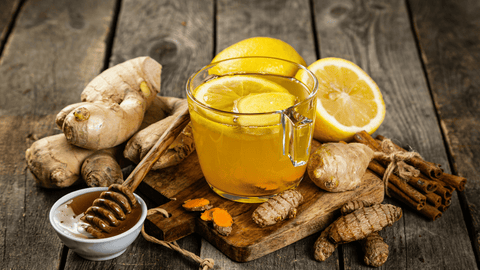
-
Antioxidant-rich: This tea is loaded with antioxidants from ginger, cinnamon, and lemon, which combat free radicals in the body. These free radicals are unstable molecules that can cause oxidative stress, leading to chronic diseases such as heart disease and cancer. Antioxidants stabilise these molecules, reducing the risk of developing such conditions.
-
Immune-boosting: The combination of these ingredients strengthens the immune system. Ginger and lemon are renowned for their immune-boosting properties. Vitamin C in lemon enhances the immune defence, and ginger has antimicrobial and antiviral benefits, making this tea an excellent choice during the cold and flu season.
-
Improves gut health: Ginger is a well-known natural remedy for various digestive issues, including nausea, bloating, and indigestion. It helps in speeding up the emptying of the stomach, which benefits people with indigestion and related stomach discomfort.
-
Lower cholesterol levels: Studies have shown that cinnamon can help lower LDL (bad) cholesterol levels while maintaining HDL (good) cholesterol levels. This can reduce the risks associated with high cholesterol, including heart disease and stroke.
-
Lower blood sugar: Cinnamon is also known for its ability to lower blood sugar levels by improving insulin sensitivity. When combined with ginger, which also has anti-diabetic properties, it makes for a potent natural remedy for managing and preventing diabetes.
-
Improves blood circulation: The components of ginger can help improve blood circulation by preventing blood clots and reducing the risk of cardiovascular diseases. Improved circulation ensures that oxygen and nutrients are efficiently distributed throughout the body.
-
Improves brain function: Both lemon and cinnamon have been linked to improved cognitive function. Cinnamon can help in the growth of neural pathways, and lemon contains compounds that protect against neurodegenerative diseases. This can lead to enhanced memory, focus, and cognitive function.
-
Helps you lose weight: Ginger tea can help you feel fuller for longer, reducing overall calorie intake. Additionally, it has been linked to increased Thermogenesis, where the body burns calories to digest food, thereby aiding weight loss efforts.
-
Soothes sore throat: This tea serves as a soothing remedy for sore throats, thanks to the anti-inflammatory properties of ginger and the soothing effect of honey. Lemon adds a dose of vitamin C, which can help fight the infection causing the sore throat.
Cinnamon Lemon Ginger Tea Ingredients
The allure of Cinnamon Lemon Ginger Tea lies in its simple yet powerful blend of ingredients. Each component is not just a flavour enhancer but also a carrier of significant health benefits. Here's a detailed look at the ingredients that make this tea both therapeutic and delightful.
-
Ginger: Known scientifically as Zingiber officinalis, ginger is a root herb with a piquant flavour and a rich history in herbal medicine. It contains gingerol, a compound with potent anti-inflammatory and antioxidant effects. Ginger aids digestion, alleviates nausea (including morning sickness and seasickness), and can fight flu and common cold symptoms. Its warming effect is believed to stimulate circulation, making it an ideal remedy for chilly days or individuals with poor circulation.
-
Lemon: This citrus fruit, rich in vitamin C, is crucial for bolstering the immune system and fighting off infections. Lemons are also high in flavonoids, which have antioxidant properties. Adding lemon to the tea not only gives it a refreshing zest but also aids in detoxification and can enhance iron absorption when consumed with meals. Lemon's alkalising effect, once metabolised, despite its initial acidity, is also celebrated for promoting overall bodily health.
-
Cinnamon: Cinnamomum verum, or "true cinnamon," is preferred for its sweeter, more refined taste compared to its counterpart, Cassia cinnamon. This spice is celebrated for its medicinal properties, including its ability to lower blood sugar levels in individuals with diabetes. Cinnamon is rich in antioxidants, which protect your body from oxidative damage caused by free radicals. It also has anti-inflammatory properties and can reduce the risk of heart disease by lowering bad LDL cholesterol and triglycerides while maintaining good HDL cholesterol levels.
-
Honey: A natural sweetener, honey complements the spicy notes of ginger and the tangy flavour of lemon beautifully. Beyond its taste, honey offers antibacterial and antifungal properties, making it a great addition to this tea for soothing sore throats and boosting overall health. Opting for raw, unprocessed honey can maximise the benefits, as it's richer in antioxidants and beneficial enzymes lost during processing.
Each ingredient in this tea blend works synergistically to promote health and well-being, making Ginger Tea with Cinnamon and Lemon a wise addition to any diet. Whether you're seeking to boost your immune system, improve your digestive health, or enjoy a warming and therapeutic beverage, this tea ticks all the boxes.
How to Make Cinnamon Ginger Tea with Lemon
Creating a cup of Cinnamon Ginger Tea with Lemon is not just about mixing ingredients; it's an experience, a ritual that comforts the soul and revitalises the body. Here's how to craft this refreshing beverage with precision and care:
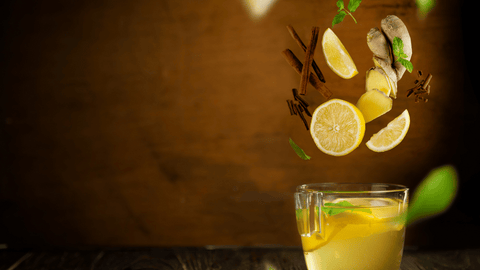
First Step: Prepare the Ginger and Lemon
Begin by selecting fresh ginger root and a ripe lemon. Fresh ginger should feel firm and smooth to the touch, with a spicy aroma. For the lemon, choose one that is bright in colour and slightly soft when squeezed, indicating juiciness.
-
Ginger: Start by peeling a 2-inch piece of ginger root. The easiest way to do this is by using the edge of a teaspoon, which allows you to scrape off the skin without wasting the flesh. Once peeled, slice the ginger into thin pieces to maximize the surface area, enhancing the extraction of its flavours and beneficial compounds during the boiling process.
-
Lemon: Wash the lemon thoroughly under running water. Then, using a sharp knife, slice the lemon into rounds. If you prefer a stronger citrus flavour, you can zest a bit of the lemon peel into the tea. However, be mindful to avoid the white pith, as it can introduce a bitter flavour.
Second Step: Add Ingredients and Boil
-
In a medium saucepan, combine about 4 cups of water with the sliced ginger and a cinnamon stick. The cinnamon stick should be broken into smaller pieces to release more flavour. If you don't have a cinnamon stick, you can substitute it with a half teaspoon of ground cinnamon, although the stick is preferred for a subtler and more aromatic infusion.
-
Bring the mixture to a boil over high heat, then reduce the heat to low, allowing the concoction to simmer. Let it gently bubble for about 15 to 20 minutes. This slow simmering process allows the water to become infused with the spicy warmth of the ginger and the sweet, woody essence of the cinnamon.
Third Step: Strain It
After simmering, remove the saucepan from the heat. Place a fine-mesh strainer over a large bowl or pitcher and pour the tea through it. This step removes the solid pieces of ginger, cinnamon, and any other sediments, ensuring the tea is smooth and pleasant to drink. Discard the solids.
Fourth Step: Add the Honey and Lemon Juice
-
Once the tea has been strained, stir in the honey while the tea is still warm. The quantity of honey can be adjusted according to taste, but start with about a tablespoon. Honey not only adds sweetness but also contributes to the tea's soothing properties, which are especially beneficial for sore throats.
-
Squeeze the juice of the lemon slices into the tea. You can adjust the amount of lemon juice according to how tangy you like your tea. Lemon not only adds a refreshing zest but also vitamin C, which is great for boosting the immune system.
-
Give the tea a final stir to ensure the honey is well dissolved and the lemon juice is evenly distributed throughout the tea. Taste and adjust the sweetness or acidity by adding more honey or lemon juice if necessary.
Your Cinnamon Ginger Tea with Lemon is now ready to be served. Pour it into your favourite cup, one that feels comforting to hold. This tea can be enjoyed hot, which is particularly soothing during the colder months or when you're feeling under the weather. For a refreshing twist, it can also be cooled and served over ice, offering a rejuvenating beverage during the warmer seasons.
Exploring Variations in the Ginger Cinnamon Tea Recipe
Adventurous enthusiasts may opt to experiment with diverse variations of ginger cinnamon lemon tea. Incorporating turmeric or green tea introduces nuanced complexities to the brew while substituting lemon with orange imparts a citrusy twist. Such variations enable enthusiasts to customise their tea-drinking experience according to personal preferences, expanding the horizons of flavour exploration.
Best Tips and Tricks for Cinnamon, Lemon, and Ginger Tea
Crafting the perfect cup of Cinnamon, Lemon, and Ginger Tea is both an art and a science. Here are some insightful tips and tricks to elevate your tea-making experience, ensuring each cup is not only soothing and delicious but also packed with health benefits.
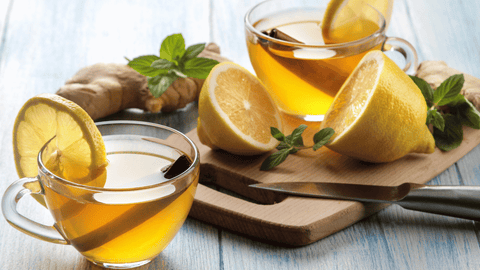
Adjusting the Strength
The strength of your tea can significantly impact its taste and therapeutic benefits. Here are a few ways to adjust it according to your preference:
-
Ginger: The potency of ginger can be varied by adjusting the amount or the slicing technique. Thinner slices expose more surface area to the water, extracting more flavour and nutrients. For a stronger ginger taste and a more intense warming effect, increase the quantity or steep it for a longer duration.
-
Cinnamon: The type of cinnamon used (Ceylon vs. Cassia) and its form (stick vs. ground) can affect the strength. Ceylon cinnamon is milder, while Cassia is more pungent. Using a cinnamon stick allows for a subtler infusion, which can be steeped longer to intensify the flavour. If you prefer a bolder cinnamon presence, add more sticks or a touch of ground cinnamon towards the end of simmering.
-
Lemon: The acidity and zestiness of lemon can be tailored by adjusting the amount of juice or zest added. For a brighter, more citrus-forward tea, increase the lemon juice or add lemon zest during the boiling process.
Remember, adjusting the strength is about finding the right balance that suits your taste and health needs while considering the interactions between the ingredients.
Using Fresh Ingredients
The quality and freshness of ingredients play a crucial role in the efficacy and flavour profile of your tea:
-
Freshness: Always opt for fresh ginger root and organic lemons. Fresh ginger contains higher levels of gingerol, the compound responsible for its medicinal properties. Organic lemons are free from pesticides and have a richer flavour.
-
Quality of Cinnamon: Invest in high-quality cinnamon sticks, preferably Ceylon cinnamon, known for its superior flavour and lower coumarin content, which is safer for regular consumption.
Using fresh and high-quality ingredients ensures that your tea is not only more flavourful but also more potent in terms of health benefits.
Reusing the Ingredients for a Second Batch
Sustainability and efficiency in the kitchen are as important as the quality of your brew:
-
After making a batch of tea, the ginger slices, cinnamon sticks, and lemon zest (if used) can often be reused for at least one more batch. While the second infusion might be milder, it still retains a good amount of flavour and health benefits. This practice not only maximises the use of your ingredients but also reduces waste.
Other Immune-Boosting Drink Recipes
Expanding your repertoire of healthful beverages can provide variety and additional benefits:
-
Turmeric and Honey Milk: A golden milk variant with anti-inflammatory and antioxidant properties, perfect for evenings.
-
Elderberry Syrup: This can be diluted in hot water for a drink rich in vitamins A, B, and C, known for its immune-boosting properties.
-
Green Tea with Mint and Lime: Offers antioxidants from green tea, digestive aid from mint, and vitamin C from lime.
Incorporating these tips into your tea-making process will not only improve the taste and health benefits of your Cinnamon, Lemon, and Ginger Tea but also enhance your overall wellness routine. Exploring other immune-boosting drinks can add delightful variety to your diet, keeping you well-hydrated and fortified against common ailments, especially during colder months or peak flu seasons.
Navigating Storage and Reheating Instructions
Upon crafting a batch of ginger cinnamon lemon tea, proper storage and reheating techniques become imperative to preserve its freshness. Storing the brew in an airtight container within the refrigerator safeguards its flavour integrity while reheating it gently on a stovetop or microwave ensures optimal taste retention. Adhering to these guidelines prolongs the enjoyment of your meticulously prepared tea infusion.
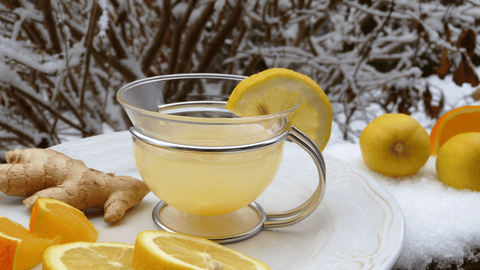
Navigating the nuances of creating the perfect cup of tea, especially one as health-centric as Lemon and Ginger Tea with Cinnamon requires a bit of know-how. Here's how to tackle common issues and maximise the health benefits of this potent blend.
Dealing with Bitterness from Citrus Peel
While lemon zest can add depth and complexity to your tea, the white part of the lemon peel, known as the pith, can impart a bitter flavour if not handled carefully. Here are a few tips to mitigate bitterness:
-
Zest Properly: Use a zester or a vegetable peeler to gently remove the zest, taking care not to include the white pith beneath. If using a peeler, you can scrape off any pith with a knife.
-
Shorter Infusion Time: If you prefer to use whole slices of lemon, including the peel, consider adding them towards the end of the boiling process. This allows the essential oils and flavour to infuse into the tea without extracting too much bitterness.
-
Cold Infusion: Alternatively, adding lemon slices to your tea after it's been removed from heat allows the citrus oils to meld into the drink more gently, reducing bitterness.
Using Ground Cinnamon
Ground cinnamon can be a convenient alternative to cinnamon sticks, but it requires a different approach to avoid overpowering your tea or creating a gritty texture:
-
Add Sparingly: Ground cinnamon is more concentrated than cinnamon sticks, so start with a pinch and adjust to taste.
-
Use a Tea Infuser: To prevent the ground cinnamon from making your tea gritty, consider placing it inside a tea infuser along with the ginger. This allows the flavour to disperse without dispersing the particles.
-
Add After Boiling: Introduce ground cinnamon to the tea after you've removed it from the heat. This method helps to preserve its essential oils and flavour, which can be diminished by prolonged boiling.
Drinking the Tea at Night
Lemon and Ginger Tea with Cinnamon can be a comforting, caffeine-free option for the evening. However, its digestive and warming properties mean it can be both soothing and stimulating:
-
Digestive Aid: Ginger can stimulate digestion, which is beneficial but may be disruptive for some if consumed immediately before bed.
-
Soothing Properties: The warmth from ginger and cinnamon has a soothing effect, making the tea a good choice for relaxing in the evening, especially if consumed a few hours before bedtime.
Does ginger and cinnamon help you lose weight?
Ginger and cinnamon are two spices often touted for their potential weight loss benefits. Ginger contains bioactive compounds such as gingerol and shogaol, which have been studied for their potential to boost metabolism and suppress appetite. Cinnamon, on the other hand, contains compounds like cinnamaldehyde, which may improve insulin sensitivity and regulate blood sugar levels, potentially aiding weight loss efforts.
However, it's essential to understand that while these spices may have some beneficial effects, they are not miracle solutions for weight loss. Incorporating ginger and cinnamon into a balanced diet and active lifestyle can complement your weight loss journey, but they should not be relied upon as sole strategies for shedding pounds.
Can lemon and ginger tea reduce belly fat?
Lemon and ginger tea is often promoted as a natural remedy for reducing belly fat. Lemon is rich in vitamin C and antioxidants, while ginger contains compounds that may promote fat-burning and aid digestion. When combined, these ingredients create a refreshing and potentially beneficial beverage. However, it's important to manage expectations.
Drinking lemon and ginger tea alone is unlikely to target belly fat directly. Weight loss, particularly in specific areas like the abdomen, requires a comprehensive approach that includes a balanced diet, regular exercise, and healthy lifestyle habits. While incorporating lemon and ginger tea into your routine can contribute to hydration and may provide some minor metabolic benefits, it's crucial to focus on overall health and wellness rather than solely relying on one beverage to achieve specific weight loss goals.
How many times a day should you drink lemon and ginger tea?
The frequency of consuming lemon and ginger tea depends on individual preferences and health goals. Generally, drinking one to three cups of lemon and ginger tea per day is considered safe for most people. Starting your day with a warm cup of lemon and ginger tea can be a refreshing way to kickstart your metabolism and aid digestion. You might also enjoy a cup in the afternoon as a midday pick-me-up or after a meal to promote digestion.
However, it's essential to listen to your body and monitor any potential adverse effects, particularly if you have sensitivities to either ingredient. Additionally, be mindful of the caffeine content if you're sensitive to stimulants. As with any dietary change, it's advisable to consult with a healthcare professional, especially if you have underlying health conditions or are pregnant or breastfeeding, to ensure that lemon and ginger tea is suitable for your circumstances.
Embracing the Benefits of Ginger Cinnamon Lemon Tea
In summary, ginger cinnamon lemon tea emerges as a multifaceted elixir, boasting a plethora of health benefits and versatile flavour profiles. Whether savoured for its antioxidant-rich composition, immune-boosting properties, or soothing effects on sore throats, this esteemed beverage remains a staple in wellness routines worldwide. For those intrigued by the potent benefits and tantalising flavours of Ginger Cinnamon Lemon Tea, we invite you to explore Mother Cuppa Tea's signature blend, Relax. Embrace the journey towards holistic well-being with each sip.
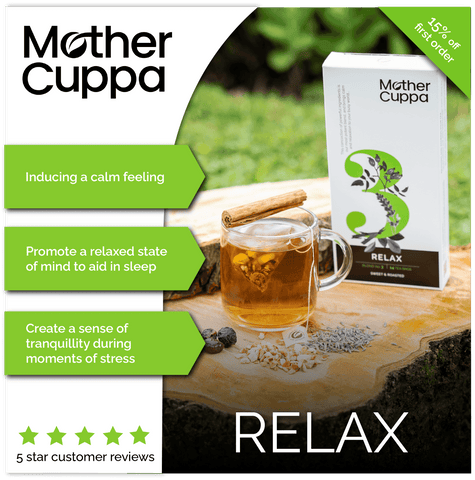







Leave a comment